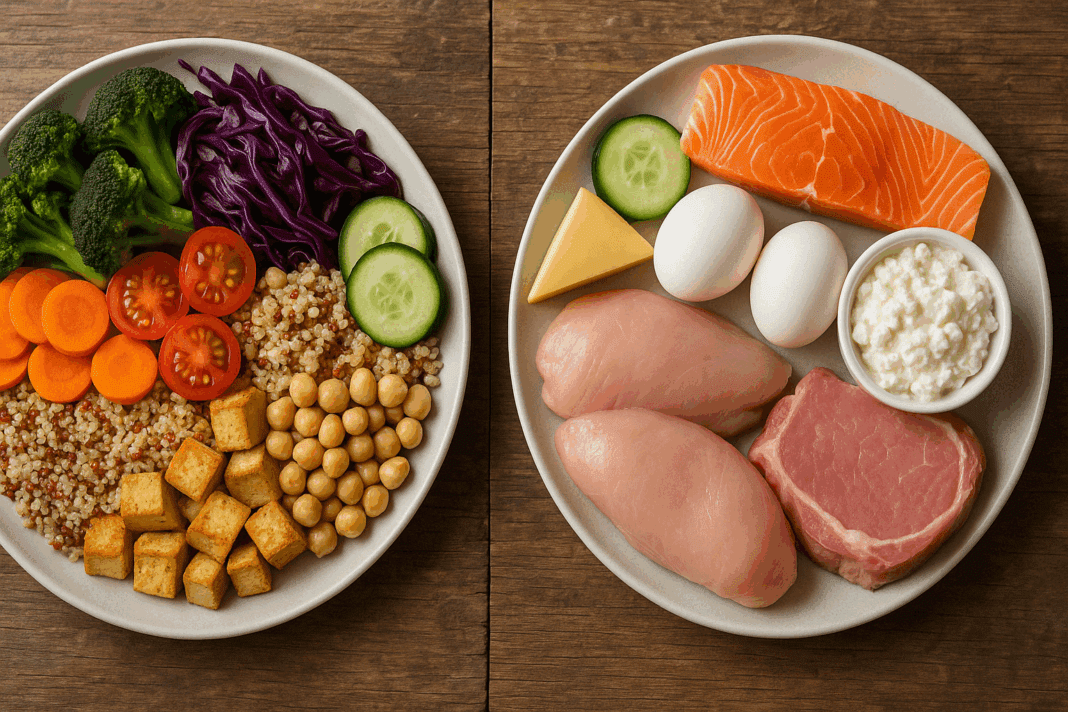When it comes to the ongoing debate of vegetarian vs non vegetarian diets, questions about health, nutrition, and longevity are central to the discussion. With millions worldwide rethinking their dietary choices for ethical, environmental, and health reasons, it becomes essential to examine the evidence behind both lifestyles. From cardiovascular health to cancer risk, nutrient adequacy to chronic disease prevention, the decision between a vegetarian and non vegetarian diet is far more than a personal preference—it’s a science-backed health strategy. This article explores what the latest peer-reviewed research says about vegetarian versus non vegetarian diets and how these choices impact long-term wellness, especially within the broader context of whole-food plant-based nutrition.
You may also like: Plant Based Diet vs Standard American Diet: What the Latest Studies Reveal About Long-Term Health Outcomes
Understanding the Core Differences Between Vegetarian and Non Vegetarian Diets
A vegetarian diet excludes meat, poultry, and fish but often includes dairy and eggs, depending on the type. Lacto-ovo vegetarians consume both dairy and eggs, while lacto-vegetarians consume dairy but not eggs. In contrast, a non vegetarian diet includes meat and other animal products as part of regular consumption. While non vegetarians have more options for protein and certain micronutrients like vitamin B12 and heme iron, vegetarians often gain the advantage of lower intake of saturated fat and cholesterol. The dietary fiber, phytonutrients, and antioxidants found in plant-based foods give vegetarians a natural edge in disease prevention.
Beyond the nutritional framework, the lifestyle associated with a vegetarian diet tends to emphasize conscious food choices. It’s not uncommon for vegetarians to also practice mindful eating and avoid ultra-processed foods. In contrast, non vegetarian diets vary greatly in quality. A person who eats lean fish and vegetables may experience very different health outcomes than someone whose diet is heavy in processed meats, saturated fat, and refined carbohydrates. The quality of both vegetarian and non vegetarian diets, therefore, plays a vital role in determining health outcomes.
Vegetarian Diets and Longevity: What the Research Shows
One of the most compelling aspects of the vegetarian vs non vegetarian conversation revolves around longevity. Several long-term cohort studies, including the Adventist Health Studies and the EPIC-Oxford study, have demonstrated that vegetarians often enjoy a lower risk of chronic illnesses that contribute to premature mortality. For instance, vegetarians in the Adventist Health Study-2 had significantly lower rates of ischemic heart disease, type 2 diabetes, and certain cancers compared to their meat-eating counterparts.
Research from the Blue Zones—regions of the world where people live notably longer and healthier lives—further supports this trend. In these zones, such as Loma Linda, California, a large proportion of the population follows plant-predominant diets, often entirely vegetarian. Diets rich in legumes, vegetables, fruits, and whole grains are staples in these communities and have been associated with a dramatic reduction in the risk of cardiovascular disease and metabolic syndrome.
However, it’s worth noting that not all vegetarians automatically enjoy longer lives. The benefits of a vegetarian lifestyle are closely tied to overall diet quality. A vegetarian who consumes mostly refined grains, fried foods, and sugary beverages may not see the same health benefits as someone who emphasizes whole-food plant-based nutrition.
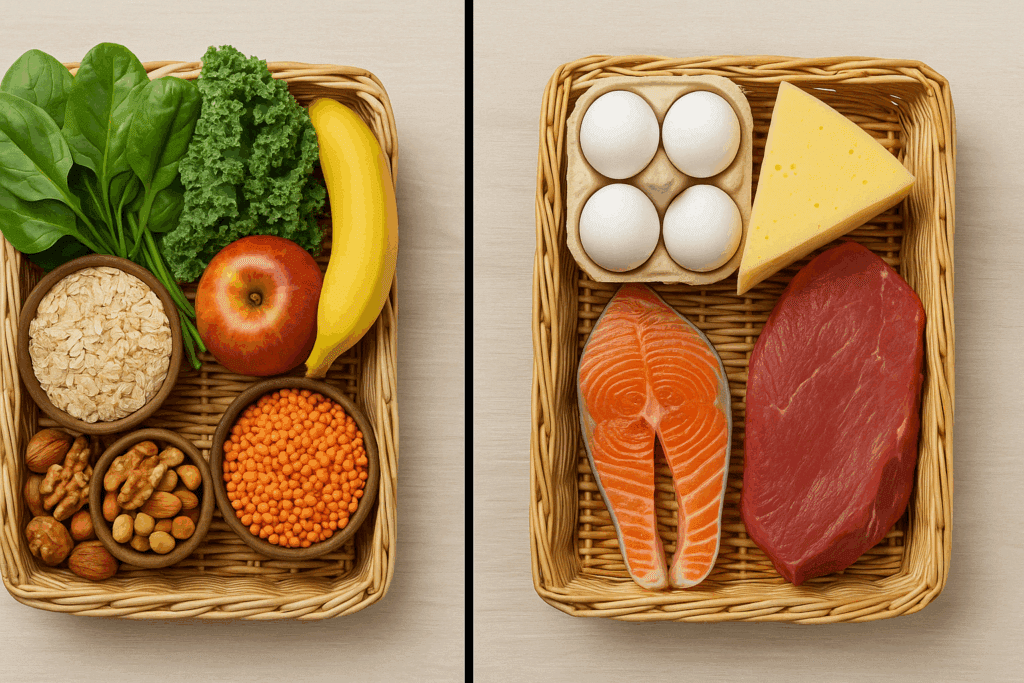
Nutrient Considerations in Vegetarian and Non Vegetarian Diets
While vegetarians have the advantage of avoiding many of the harmful components found in processed meat, such as nitrates and nitrites, they must be diligent in obtaining key nutrients that are more bioavailable in animal foods. These include vitamin B12, iron, zinc, omega-3 fatty acids (particularly EPA and DHA), and calcium. The good news is that with proper planning and a focus on nutrient-dense whole foods, these needs can be met on a vegetarian diet.
For instance, lentils, spinach, tofu, and fortified cereals are rich in iron, although the non-heme form of iron found in plants is less easily absorbed than heme iron in meat. Vitamin C-rich foods like citrus fruits and bell peppers can enhance iron absorption. Zinc and calcium can be obtained from dairy (for lacto-vegetarians), nuts, seeds, and fortified plant milks. Omega-3s from flaxseeds, chia seeds, and walnuts help, but vegetarians who wish to optimize DHA and EPA levels may consider algae-based supplements.
Non vegetarians, on the other hand, typically meet these nutrient requirements with greater ease due to the inclusion of meat, fish, and eggs. However, they may also have a higher intake of saturated fat and cholesterol, especially if they consume red and processed meats frequently. This brings elevated risks of cardiovascular disease, as confirmed by numerous meta-analyses.
Heart Health: A Major Battleground in the Vegetarian vs Non Vegetarian Debate
Perhaps one of the most well-studied areas in the vegetarian versus non vegetarian debate is cardiovascular health. Plant-based diets are consistently associated with lower LDL cholesterol, lower blood pressure, and reduced inflammation. These benefits are largely attributed to the absence of dietary cholesterol and saturated fats and the high intake of soluble fiber, antioxidants, and potassium-rich foods.
Non vegetarian diets that include high amounts of red and processed meats have been associated with increased risk of coronary artery disease. A large meta-analysis in Circulation revealed that individuals who consumed more red and processed meat had a 42% higher risk of heart disease. In contrast, vegetarians—particularly those adhering to a whole-food plant-based diet—tend to have healthier lipid profiles and reduced arterial plaque buildup.
Nevertheless, not all meat-inclusive diets are harmful. The Mediterranean diet, which includes moderate amounts of fish, poultry, and dairy, has also been shown to reduce cardiovascular risk. This suggests that it’s not necessarily the inclusion of meat, but the type and amount consumed, that matters most.

Cancer Risk and Dietary Choices: A Growing Body of Evidence
When analyzing vegetarian vs non vegetarian diets in relation to cancer, research again tends to favor plant-based patterns. Vegetarians generally have lower incidences of colon, breast, and prostate cancers. This protective effect is likely due to the high levels of antioxidants, phytochemicals, and dietary fiber in plant-based foods, which reduce inflammation and improve gut health.
In contrast, diets rich in processed and red meats are associated with higher cancer risks. The World Health Organization has classified processed meat as a Group 1 carcinogen, meaning there is convincing evidence that it causes cancer, particularly colorectal cancer. Red meat is classified as a probable carcinogen (Group 2A), particularly when consumed in large quantities.
Again, quality matters. A non vegetarian diet rich in lean poultry and fish, paired with vegetables and whole grains, may pose far less risk than one built around bacon, sausage, and charred steak. But from a preventative standpoint, reducing meat intake—especially processed varieties—remains a sound health strategy.
Weight Management and Metabolic Health in Plant-Based Versus Meat-Based Diets
Weight control is another area where plant-based diets tend to shine. Numerous studies have shown that vegetarians generally have lower body mass indexes (BMIs) than non vegetarians. This difference likely stems from higher fiber intake, lower caloric density, and the absence of high-fat meats.
A randomized controlled trial published in the Journal of the American College of Nutrition found that people following a vegetarian diet lost more weight than those on a conventional low-calorie diet. Additionally, vegetarians often experience improvements in insulin sensitivity, which reduces the risk of developing type 2 diabetes.
That said, adopting a vegetarian diet is not a guarantee of weight loss. Individuals who rely on refined carbohydrates, sugary snacks, and fried foods may still gain weight. As with any diet, nutrient density and portion control remain crucial.
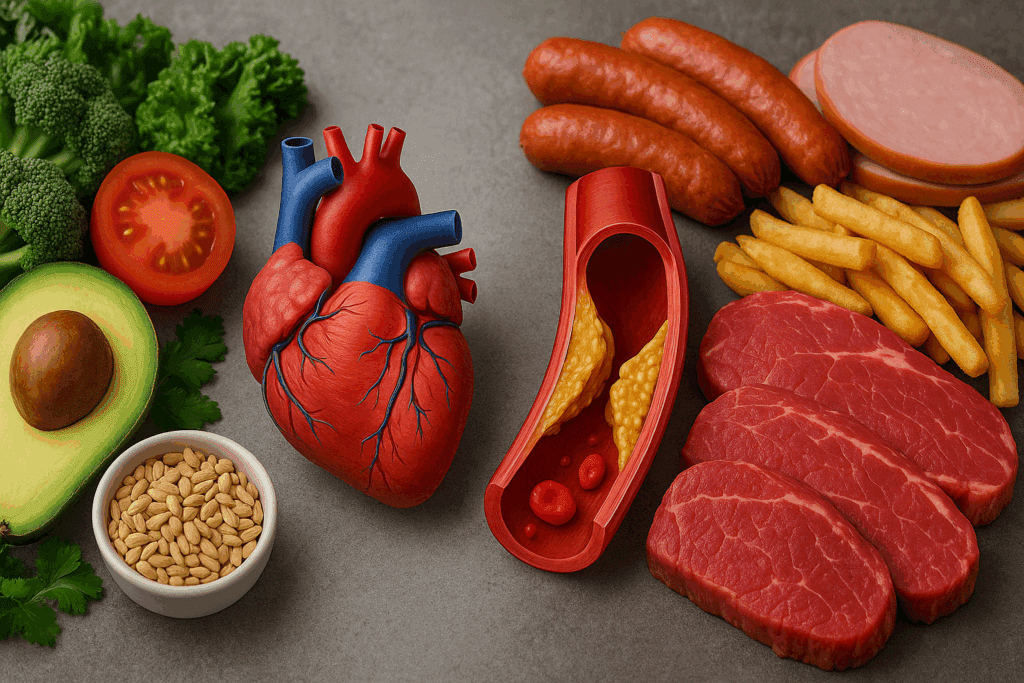
Common Questions: Do Vegetarians Eat Butter, Eggs, Milk, or Rice?
Many people unfamiliar with vegetarianism often ask: does a vegetarian eat butter? Can vegetarians eat eggs and milk? Do vegetarians eat rice? The answers depend on the type of vegetarian. Lacto-vegetarians consume dairy, so they may include butter and milk in their diet, while ovo-vegetarians include eggs. Lacto-ovo vegetarians include both. However, strict vegetarians or vegans exclude all animal products. Rice, being a plant-based grain, is universally consumed among vegetarians.
These dietary choices can influence the nutritional adequacy of a vegetarian diet. For instance, the inclusion of eggs and milk can significantly boost protein, vitamin B12, and calcium intake. Meanwhile, brown rice offers whole-grain fiber, magnesium, and trace minerals, making it a staple in many plant-based diets.
Keto Diets and Plant-Based Eating: Can They Coexist?
A growing trend in nutritional science is the rise of the ketogenic diet, known for its emphasis on high-fat, low-carb eating. This brings us to a new arena of debate: s keto low carb compatible with plant-based diets? And what does the science say about the ketogenic diet vs low carb or low carb diet keto diet comparisons?
Traditional ketogenic diets are often meat-heavy, making them difficult to reconcile with vegetarian or plant-based principles. However, a plant-based keto diet is possible using foods like avocados, nuts, seeds, olive oil, and non-starchy vegetables. In comparing a keto diet vs low carb diet, the key difference lies in macronutrient ratios: keto aims for a state of ketosis by drastically reducing carbs, while low carb diets are more flexible and less extreme.
So, is keto a low carb diet by definition? Yes—but not all low carb diets are ketogenic. This distinction matters when evaluating the sustainability and healthfulness of the diet. A keto plan rich in plants and healthy fats may offer benefits like improved blood sugar control and short-term weight loss. However, questions remain: is keto a good diet for long-term health? And more importantly, is a keto diet sustainable over years or decades? Studies suggest potential risks related to nutrient deficiencies and cardiovascular strain, especially when plant foods are minimized.

Vegetarian vs Non Vegetarian for Gut Health and Microbiome Diversity
Emerging research highlights the profound effect of diet on the gut microbiome, the ecosystem of trillions of bacteria in our digestive tract. A diverse and fiber-rich diet promotes a robust microbiome, which in turn supports immune function, mental health, and disease prevention. Here, vegetarian diets, particularly those emphasizing whole foods, have a clear advantage.
Studies have shown that vegetarians tend to harbor a greater diversity of beneficial gut bacteria, thanks to higher intakes of prebiotic fibers from legumes, fruits, vegetables, and whole grains. Non vegetarians, especially those consuming high amounts of animal fat and low amounts of fiber, tend to have less microbial diversity. This can lead to increased gut inflammation and poorer metabolic outcomes.
It’s also important to consider that certain compounds formed during meat digestion, such as trimethylamine N-oxide (TMAO), have been linked to increased cardiovascular risk. While not all meat eaters experience elevated TMAO levels, individuals with less favorable gut bacteria compositions may be more susceptible.
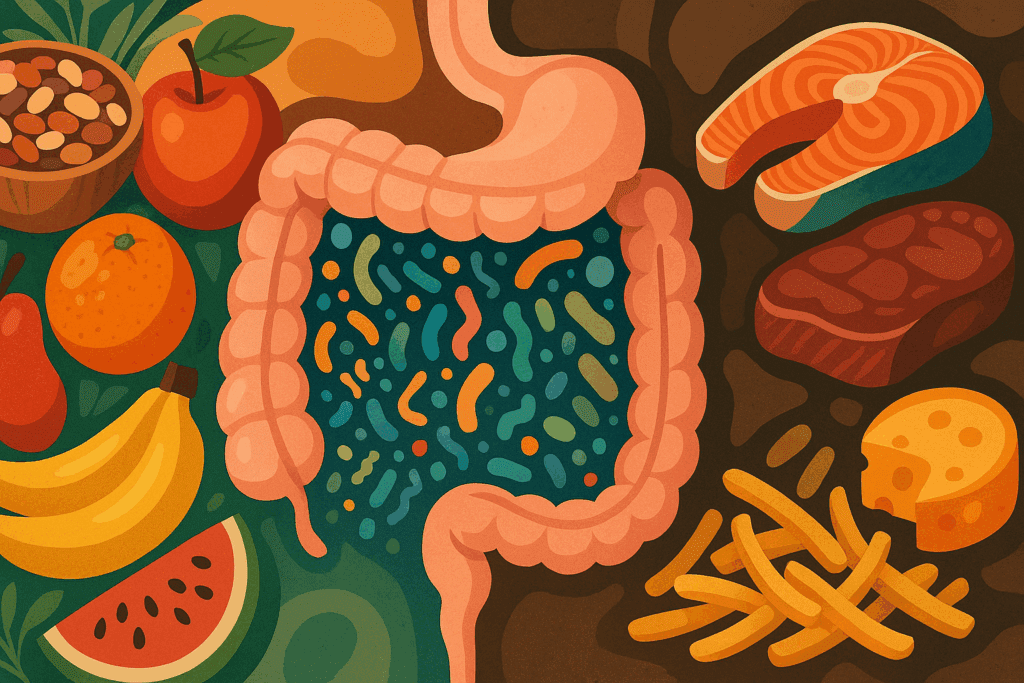
Frequently Asked Questions: Vegetarian vs Non Vegetarian Diets
1. How do vegetarian versus non vegetarian diets affect mental health and cognitive performance over time?
While much of the conversation surrounding vegetarian vs non vegetarian diets centers on physicalhealth, recent research has begun to uncover implications for mental wellness and cognitive longevity. Diets rich in antioxidants and polyphenols—primarily found in fruits, vegetables, and whole grains common in vegetarian diets—appear to support neuroplasticity and reduce oxidative stress in the brain. In contrast, excessive consumption of saturated fats and processed meats, often present in non vegetarian diets, has been linked to inflammation and cognitive decline. Long-term adherence to a whole-food vegetarian diet may help preserve memory and reduce the risk of neurodegenerative diseases like Alzheimer’s, though nutrient monitoring, particularly for B12 and omega-3s, remains critical. The comparison of vegetarian versus non vegetarian dietary patterns in mental health continues to be an emerging field with growing significance.
2. Are there environmental or planetary health implications tied to the vegetarian vs non vegetarian debate?
Yes, beyond personal wellness, the vegetarian versus non vegetarian decision significantly affectsplanetary health. Livestock farming accounts for a substantial portion of global greenhouse gas emissions, deforestation, and freshwater use. Shifting toward a plant-based diet—even if not entirely vegetarian—can dramatically reduce one’s ecological footprint. Studies have shown that vegetarian diets require far fewer natural resources and result in lower carbon emissions compared to meat-centric eating patterns. Therefore, the vegetarian vs non vegetarian conversation also intersects with sustainability and climate change mitigation strategies on a global scale.
3. Can a vegetarian diet be optimized for high athletic performance compared to a non vegetarian one?
Contrary to outdated myths, vegetarian athletes can perform at elite levels when their diets are wellstructured. In fact, many professional athletes, including Olympians and endurance competitors, follow plant-based regimens that rival or outperform their non vegetarian peers. Vegetarian vs non vegetarian performance metrics often come down to protein quality, nutrient timing, and recovery strategies rather than meat consumption alone. Plant-based proteins like lentils, soy, tempeh, and legumes can fulfill rigorous energy demands when paired correctly. Furthermore, reduced inflammation and improved cardiovascular efficiency seen in plant-based diets may offer recovery advantages for vegetarian athletes.
4. How does the social perception of vegetarian versus non vegetarian eating affect individual adherence and long-term success?
Social and cultural pressures play an influential role in dietary adherence, especially when contrastingvegetarian vs non vegetarian habits. In many societies, meat is traditionally tied to celebration, masculinity, or status, making vegetarianism seem counter-normative or even inconvenient. However, as plant-based eating gains mainstream traction and visibility, including among celebrities and healthcare professionals, social validation is improving. Studies in behavioral nutrition show that when vegetarian diets are supported by family, community, or cultural narratives, individuals are more likely to maintain them long-term. Addressing the social dimension is essential to understanding why some people succeed in their vegetarian journey while others revert to non vegetarian patterns.
5. Do vegetarian diets provide adequate options for growing children and adolescents compared to non vegetarian diets?
Many parents question whether children can thrive on vegetarian diets compared to non vegetarianoptions. Pediatric nutrition experts agree that with proper planning, vegetarian diets can fully support growth, cognitive development, and immune health in children. Iron, zinc, calcium, and B12 are nutrients that require special attention, but these can be provided through fortified foods or supplements when needed. In the vegetarian vs non vegetarian discussion for kids, the key distinction lies not in whether meat is present, but in the overall diversity and quality of the food provided. Whole grains, legumes, nuts, seeds, fruits, and vegetables—staples in vegetarian diets—build a robust foundation for child development.
6. How does gut health evolve differently on a vegetarian versus non vegetarian diet?
The gut microbiome is incredibly sensitive to dietary inputs, and it responds distinctly to vegetarianvs non vegetarian food patterns. Plant-based diets tend to foster greater microbial diversity, thanks to their rich fiber content and abundance of prebiotics. These support beneficial bacteria that regulate inflammation, mood, metabolism, and immunity. In contrast, non vegetarian diets high in saturated fat and low in fiber may lead to a proliferation of less favorable bacteria associated with chronic disease. Interestingly, even a short-term shift from non vegetarian to vegetarian eating can yield positive microbial changes, which highlights how quickly the gut environment responds to dietary choices.
7. Are vegetarian diets more or less expensive than non vegetarian diets in the long term?
Affordability is a practical consideration in the vegetarian vs non vegetarian conversation. Whilespecialty plant-based products like vegan cheeses or meat substitutes can be costly, a diet centered on whole plant foods—such as beans, lentils, rice, oats, and seasonal produce—is often more budget-friendly than one that includes regular servings of meat, poultry, or fish. Over time, the reduced healthcare costs linked to the prevention of diet-related diseases may also translate to financial savings for vegetarians. However, food deserts and limited access to fresh produce can create challenges, making community-level interventions vital for equitable dietary transitions.
8. How does taste satisfaction compare in vegetarian versus non vegetarian diets?
Taste is a subjective but powerful driver of dietary choices, and it plays a subtle yet important role inthe vegetarian vs non vegetarian decision-making process. While non vegetarian dishes offer umami and richness from meat, vegetarian meals can replicate these flavors through culinary techniques like roasting, caramelizing, fermenting, and layering spices. Chefs around the world have shown that a vegetarian dish, when thoughtfully composed, can match or exceed the complexity of meat-based meals. From mushroom bourguignon to jackfruit tacos, plant-based cuisine is evolving in flavor innovation and cultural sophistication. As plant-based culinary creativity expands, many people report finding greater taste satisfaction and variety on vegetarian menus than they ever expected.
9. What are the implications of vegetarian vs non vegetarian eating in global food security?
From a macroeconomic perspective, vegetarian versus non vegetarian food production has deepimplications for global food security. Producing meat requires significantly more land, water, and feed crops than growing plant foods. By reducing animal product consumption, global agriculture could redirect grain supplies currently used for livestock feed to human consumption, thereby alleviating food scarcity. This shift could also buffer against the volatility of food systems in the face of climate disruption. Thus, the vegetarian vs non vegetarian decision extends beyond individual nutrition—it intersects with global equity, resource distribution, and the capacity to sustainably feed a growing population.
10. How might future innovations in food technology influence the vegetarian versus non vegetarian landscape?
Technological advances are reshaping the boundaries between vegetarian and non vegetarianoptions. Innovations such as cultured meat, precision fermentation, and plant-based analogs are narrowing the sensory and nutritional gap between the two. As these products become more affordable and widely accepted, they may redefine traditional dietary labels. The future of the vegetarian vs non vegetarian divide may lie not in binary choices but in a spectrum of options that incorporate the best of both approaches—taste, nutrition, and sustainability. These developments offer hope for reconciling cultural preferences with health goals and environmental imperatives, blurring the once-clear line between these two dietary ideologies.
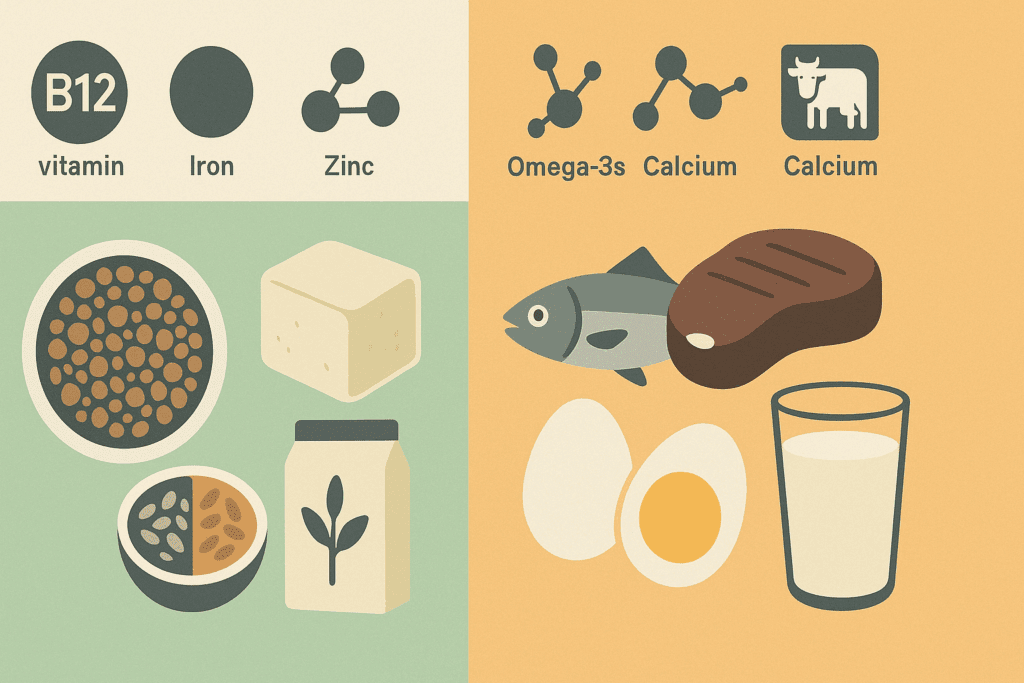
Final Thoughts on Vegetarian vs Non Vegetarian: What the Science Truly Says About Lifelong Health
When all the evidence is weighed, the question of vegetarian vs non vegetarian diets is less about strict categorizations and more about overall dietary patterns. Plant-based diets, when centered on whole foods and appropriately planned, offer powerful benefits for heart health, cancer prevention, weight management, and longevity. But a non vegetarian diet that emphasizes lean proteins, plenty of vegetables, and limited processed foods can also support good health.
For individuals considering a transition, it’s reassuring to know that you don’t have to give up all animal products to reap the benefits of a plant-centric lifestyle. Even reducing meat consumption a few days a week can yield measurable improvements in metabolic and cardiovascular health. And for those exploring more restrictive options like plant-based keto, it’s essential to ensure nutrient adequacy and long-term sustainability.
Ultimately, the most health-supportive diet is one that prioritizes whole, minimally processed foods, diverse plant ingredients, and mindful nutrient balance—regardless of whether it includes meat. The science is clear: it’s the quality of the food, not just the label, that makes the biggest difference.
As dietary research evolves, future studies will continue to refine our understanding of the nuanced relationship between what we eat and how we age. But for now, the evidence strongly supports a shift toward more plant-based meals—not only for personal health but for the health of our planet as well.
Was this article helpful? Don’t let it stop with you. Share it right now with someone who needs to see it—whether it’s a friend, a colleague, or your whole network. And if staying ahead on this topic matters to you, subscribe to this publication for the most up-to-date information. You’ll get the latest insights delivered straight to you—no searching, no missing out.
Further Reading:
Does the Vegan Diet Extend Your Lifespan?
Plant-based diets and long-term health: findings from the EPIC-Oxford study
Disclaimer
The information contained in this article is provided for general informational purposes only and is not intended to serve as medical, legal, or professional advice. While NewsHealthWatch strives to present accurate, up-to-date, and reliable content, no warranty or guarantee, expressed or implied, is made regarding the completeness, accuracy, or adequacy of the information provided. Readers are strongly advised to seek the guidance of a qualified healthcare provider or other relevant professionals before acting on any information contained in this article. NewsHealthWatch, its authors, editors, and contributors expressly disclaim any liability for any damages, losses, or consequences arising directly or indirectly from the use, interpretation, or reliance on any information presented herein. The views and opinions expressed in this article are those of the author(s) and do not necessarily reflect the official policies or positions of NewsHealthWatch.

